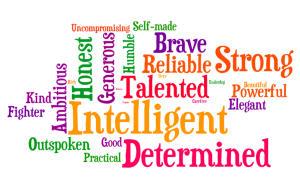Everyone needs role models. Has anyone ever asked you, “What’s the best thing I can do for my child?” Maybe someone speculated about their sibling belonging to the ASD club. Any time someone wants to pick your brain in this arena, they are curious about how to reach their loved one. They seek good advice because they haven’t found it yet. Any moment when you effectively change someone’s mind and perception, you become a leader. Since I started telling my own stories, I’ve seen next to nothing about autism and role models. If you’re like me, you had several great ones. Any time you find people looking for advice and counsel. This field hasn’t made me optimistic at all. No matter how much I constantly insist this is more than a socialization problem, I doubt anyone believes me.
This could be you. Source: Life Creations
Are you up to this challenge? Source: EUWomen
Richard Feynman wrote the book on quantum mechanics, in which he said, “No one knows what quantum mechanics is.” I feel the same way about Asperger’s, autism, and the other ASDs. Being interested in all kinds of knowledge guides me when people ask me for advice. It’s the only way I know how to connect with others. Asperger’s has been part of me from my entire life, but it’s just a fraction of myself. You’ll hear people talking about cures, treatments, and services. This rings hollow without role models. What role models provide is knowledge and patience. These two concepts are missing from the public conversation about autism. Knowledge helps channel a kid’s innate curiosity. Patience allows kids room to grow and not feel defined by their mistakes. It’s a challenge, but the two must be intertwined when reaching an autistic child. It’s why I felt fortunate by the people I’ve been around growing up. My parents and Grampa had scant knowledge of autistic anything when I was little. Dad and Grampa were interested, retired men with plenty of time on their hands, each with an unflinching moral compass the likes of which I haven’t seen duplicated. While their ethical and moral standards sounded like an impossibly heavy weight to bear, I wouldn’t trade it for anything. Living up to their expectations motivated me more than Asperger’s ever could despite facing disappointment and failure countless times.
Many elderly folks I had around me make me nostalgic. Every Sunday, my dad met on average a dozen friends for bagels and conversation. When I didn’t have Sunday school, I was nearby him. When I did, I was there before and after class. I had plenty of space to run around and window-shop if I didn’t want to sit still. Little by little I started to understand the ideas and issues my dad discussed with his friends. When I was 7 or 8, it sounded like genius level discourse, with guests far more likeable than what was on Sunday morning roundtable shows at the same time. As a matter of fact, he usually disagreed with others not because it was his personal opinion, and certainly not because politics was personal. His approach was all about finding the most relevant facts, and seeing how others would respond. Everyone agreeing with everyone is boring. Not letting things devolve like the cable news networks regularly do is a skill. I couldn’t plan a social scenario any better.
I can’t change any of my past embarrassing stories. What I can do something about is trying to keep others out of similar situations. I’m trying to pass on my knowledge because I know how much it hurts when no matter what you try, no one seems to understand you and the world seems intent on breaking you. Many years later, after I finally learned what it took to be an adult, I looked online to see what was surrounding ASDs and felt overwhelming disappointment and anger. Countless parents and clinicians always harped on our deficiencies. Others who founded their own blogs and attempted to make a name for themselves sorely lacked patient people around them. If you asked me how I got here, patience is a crucial reason why. I always had someone patient around me when I felt successful, whether or not they knew anything about my brain. It was true for friends, work, or any of the adults I ever gravitated towards. Ask yourself where you or your loved one can find that sense that they belong. There’s not much more anyone can ask for. I want to know where the autistic role models are. Surprise me because I don’t know. Call this an exercise in patience. I’m trying to work on mine.

